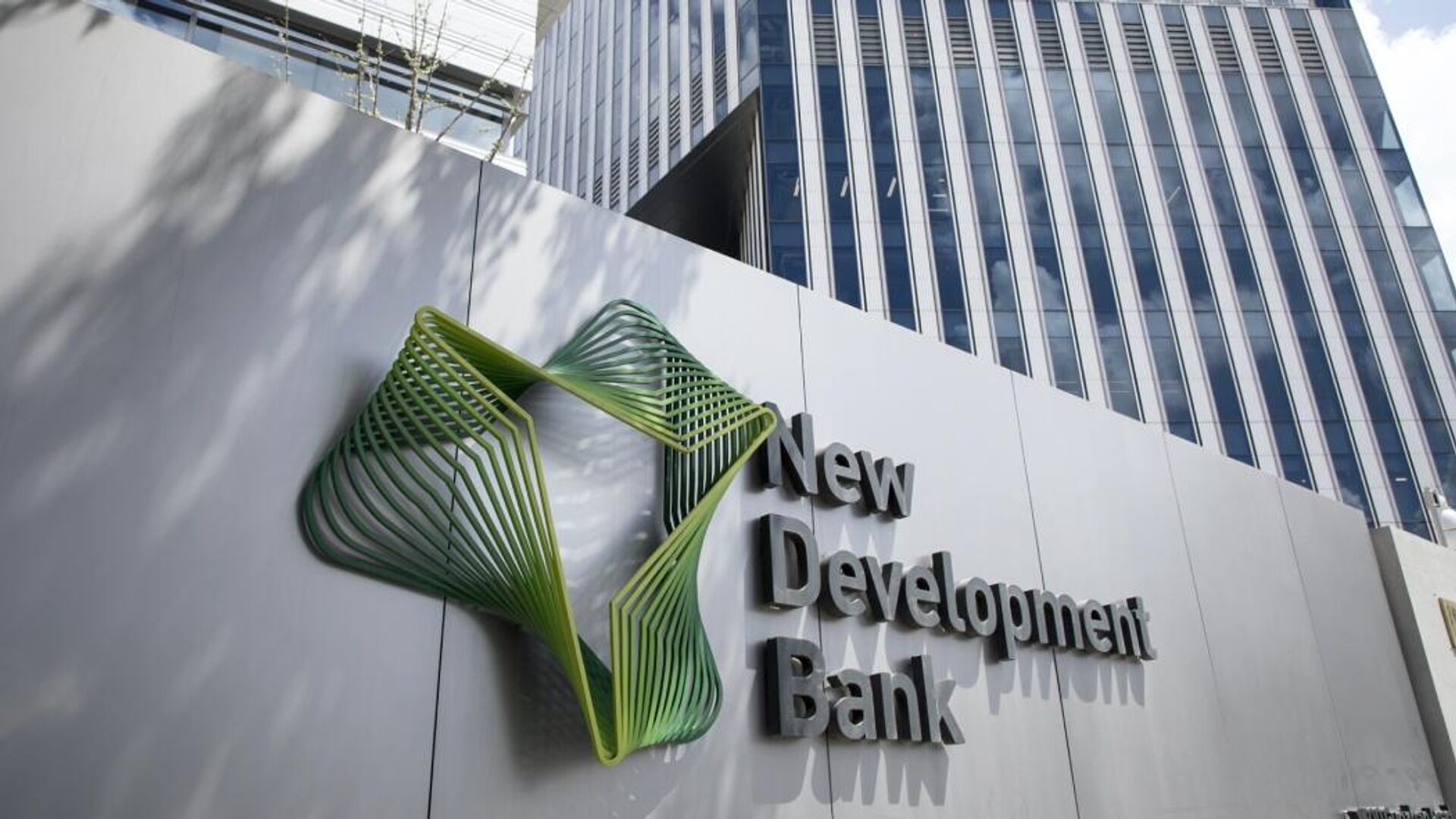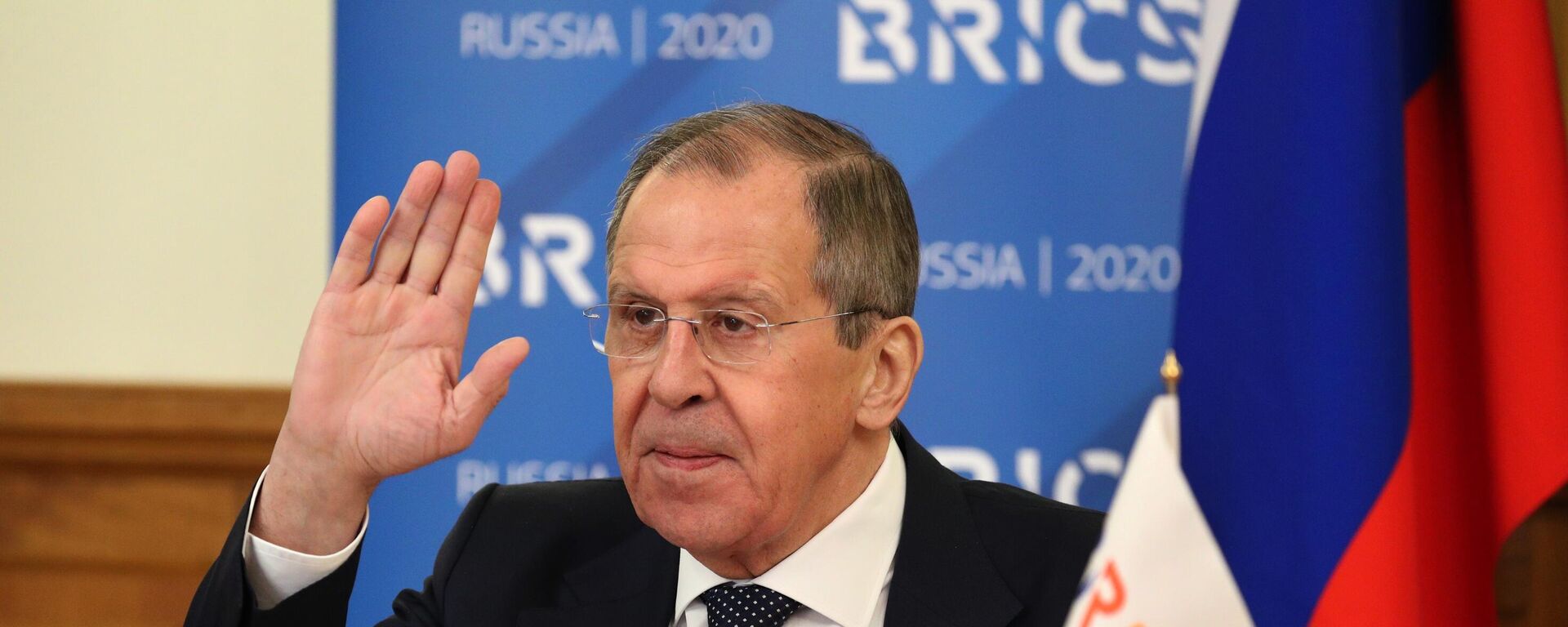https://sputniknews.in/20240611/dedollarisation-brics-backs-boosting-use-of-local-currencies-expanding-ndb-7587867.html
Dedollarisation: BRICS Backs Boosting Use of Local Currencies, Expanding NDB
Dedollarisation: BRICS Backs Boosting Use of Local Currencies, Expanding NDB
Sputnik India
The BRICS Foreign Ministers' Meeting on 10-11 June under the Russian Presidency is the first since the group formally enrolled four new members-Egypt, Ethiopia, Iran and the United Arab Emirates (UAE).
2024-06-11T13:49+0530
2024-06-11T13:49+0530
2024-06-11T13:52+0530
brics
un security council (unsc)
ethiopia
egypt
iran
european union (eu)
india
russia
china
south africa
https://cdn1.img.sputniknews.in/img/07e8/06/0b/7590156_0:0:1050:591_1920x0_80_0_0_2779bdc44d05a18f72f465297a4d2872.jpg
The BRICS nations have stressed the importance of “enhanced use of local currencies" in trade and financial transactions among the nine nations of the grouping, according to a 54-paragraph joint statement after BRICS Foreign Ministers' Meeting in the Russia's Nizhny Novgorod on Monday.The top diplomats of BRICS nations expressed their support for "further expansion" of the New Development Bank (NDB) through an early consideration of applications of BRICS members, in line with the approved policies.Currently, NDB's membership comprises the five founding BRICS members, also the United Arab Emirates, Uruguay, Bangladesh and Egypt.Chaired by Russian Foreign Minister Sergei Lavrov, the BRICS Foreign Ministers' meeting was attended by top diplomats from Brazil, China, South Africa, Egypt, Ethiopia, the United Arab Emirates (UAE) and Iran, as well as nearly 15 other guest nations. India was represented by senior diplomat Dammu Ravi, Secretary (Economic Relations) at the Ministry of External Affairs (MEA).The BRICS ministers noted a "considerable interest" among developing countries to join the grouping.BRICS Expresses Concern Over 'Unilateral Coercive Measures'Meanwhile, the joint statement expressed concern over the use of "unilateral coercive measures" which are against the principles of the United Nations (UN) Charter for producing: negative effects on economic growth, trade, energy, health and food security notably in the developing world", an apparent reference to western sanctions.Additionally, the ministers backed the further promotion of energy cooperation among BRICS group, including in the realm of critical minerals which are crucial for energy transition.It also condemned "unilateral, punitive and discriminatory protectionist measures" such as carbon border adjustment mechanisms (CBAMs), which seemed to be a reference to EU’s upcoming Carbon Tax which kicks in 2026.The EU tax proposes levying tariffs on what the western bloc deems "carbon-intensive" imports such as steel products and cement from developing nations. India has strongly opposed the carbon tax and threatened to retaliate against EU if the additional tax is implemented.BRICS Nations Back Greater Say in UN Security CouncilAt the same time, the official joint record reiterates calls for "comprehensive reform" of the UN Security Council by increasing the representation of developing nations from Africa, Asia and Latin America and address their "legitimate aspirations".Moreover, it calls for a "greater role" for BRICS states in global governance architecture, including the UN Security Council.BRICS Expresses 'Grave Concern' over Gaza SituationThe BRICS ministers expressed "grave concern" over the worsening situation in the "Occupied Palestinian Territory", according to the document.Nevertheless, the ministers called for an "immediate and unconditional release of all hostages" by Hamas.Israel's attacks in Rafah are the other matter of concern, which is mentioned by the top diplomats, who warn that an Israeli military offensive in Palestine could further deteriorate the humanitarian situation.
https://sputniknews.in/20240610/lavrov-affirms-commitment-to-enhancing-international-trade-platform-at-brics-meeting-7581795.html
ethiopia
egypt
iran
india
russia
china
south africa
uae
us
gaza strip
palestine
israel
ukraine
Sputnik India
feedback.hindi@sputniknews.com
+74956456601
MIA „Rossiya Segodnya“
2024
Dhairya Maheshwari
https://cdn1.img.sputniknews.in/img/07e6/0c/13/138962_0:0:641:640_100x100_80_0_0_2cb44360dbcdf6d84bf4b299cd045917.jpg
Dhairya Maheshwari
https://cdn1.img.sputniknews.in/img/07e6/0c/13/138962_0:0:641:640_100x100_80_0_0_2cb44360dbcdf6d84bf4b299cd045917.jpg
News
en_IN
Sputnik India
feedback.hindi@sputniknews.com
+74956456601
MIA „Rossiya Segodnya“
Sputnik India
feedback.hindi@sputniknews.com
+74956456601
MIA „Rossiya Segodnya“
Dhairya Maheshwari
https://cdn1.img.sputniknews.in/img/07e6/0c/13/138962_0:0:641:640_100x100_80_0_0_2cb44360dbcdf6d84bf4b299cd045917.jpg
brics foreign ministers meeting, brics expansion, brics dedollarisation, brics news, brics summit, brics russian presidency, eu carbon tax, eu cbam, western sanctions, western sanctions on russia, g7 sanctions, brics new members, ndb new members, dedollarisation news, russia india relations, modi news, modi speech, putin news, putin speech
brics foreign ministers meeting, brics expansion, brics dedollarisation, brics news, brics summit, brics russian presidency, eu carbon tax, eu cbam, western sanctions, western sanctions on russia, g7 sanctions, brics new members, ndb new members, dedollarisation news, russia india relations, modi news, modi speech, putin news, putin speech
Dedollarisation: BRICS Backs Boosting Use of Local Currencies, Expanding NDB
13:49 11.06.2024 (Updated: 13:52 11.06.2024) The BRICS Foreign Ministers' Meeting on 10-11 June under the Russian Presidency is the first since the group formally enrolled four new members-Egypt, Ethiopia, Iran and the United Arab Emirates (UAE).
The BRICS nations have stressed the importance of “enhanced use of local currencies" in trade and financial transactions among the nine nations of the grouping, according to a 54-paragraph joint statement after BRICS Foreign Ministers' Meeting in the Russia's Nizhny Novgorod on Monday.
The top diplomats of BRICS nations expressed their support for "further expansion" of the New Development Bank (NDB) through an early consideration of applications of BRICS members, in line with the approved policies.
Currently, NDB's membership comprises the five founding BRICS members, also the United Arab Emirates, Uruguay, Bangladesh and Egypt.
"They agreed to jointly develop the New Development Bank to a new type of Multilateral Development Banks of the 21st century," said the joint statement.
Chaired by Russian Foreign Minister Sergei Lavrov, the BRICS Foreign Ministers' meeting was attended by top diplomats from Brazil, China, South Africa, Egypt, Ethiopia, the United Arab Emirates (UAE) and Iran, as well as nearly 15 other guest nations. India was represented by senior diplomat Dammu Ravi, Secretary (Economic Relations) at the Ministry of External Affairs (MEA).
The BRICS ministers
noted a "considerable interest" among developing countries to join the grouping.
"They discussed the Partner Country Model in line with the paragraph 92 of the Johannesburg II Declaration. They reviewed the progress on the relevant preparations to be reported to the BRICS Leaders by the XVI Summit in Kazan," the document says.
BRICS Expresses Concern Over 'Unilateral Coercive Measures'
Meanwhile, the joint statement expressed concern over the use of "unilateral coercive measures" which are against the principles of the United Nations (UN) Charter for producing: negative effects on economic growth, trade, energy, health and food security notably in the developing world", an apparent reference to
western sanctions.
Additionally, the ministers backed the further promotion of energy cooperation among BRICS group, including in the realm of critical minerals which are crucial for energy transition.
"They also reaffirmed that the rush for these minerals, which are mostly found in the developing world, should not replicate the previous injustice and inhumane history of colonialism," the document reads.
It also condemned "unilateral, punitive and discriminatory protectionist measures" such as carbon border adjustment mechanisms (CBAMs), which seemed to be a reference to EU’s upcoming Carbon Tax which kicks in 2026.
The EU tax proposes levying tariffs on what the western bloc deems "carbon-intensive" imports such as steel products and cement from developing nations. India has strongly opposed the carbon tax and threatened to retaliate against EU if the additional tax is implemented.
As a matter of principle, the BRICS ministers emphasised in the joint statement that "unilateral trade measures based on climate or environment".
BRICS Nations Back Greater Say in UN Security Council
At the same time, the official joint record reiterates calls for
"comprehensive reform" of the UN Security Council by increasing the representation of developing nations from Africa, Asia and Latin America and address their "legitimate aspirations".
Moreover, it calls for a "greater role" for BRICS states in global governance architecture, including the UN Security Council.
BRICS Expresses 'Grave Concern' over Gaza Situation
The BRICS ministers
expressed "grave concern" over the worsening situation in the "Occupied Palestinian Territory", according to the document.
"In this regard they called for the effective implementation of the relevant UNGA resolutions and UNSC resolution 2720 and for immediate safe and unhindered delivery of humanitarian assistance at scale directly to the Palestinian civilian population throughout the Gaza Strip. They also called for the effective implementation of the UNSC resolution 2728 for an immediate, durable, and sustained ceasefire," it says.
Nevertheless, the ministers called for an "immediate and unconditional release of all hostages" by Hamas.
Israel's attacks in Rafah are the other matter of concern, which is mentioned by the top diplomats, who warn that an Israeli military offensive in Palestine could further deteriorate the humanitarian situation.
"The Ministers expressed serious concern at Israel’s continued blatant disregard of international law, the UN Charter, UN resolutions and Court orders," the joint record said, reiterating BRICS' commitment to a dual-state solution.



